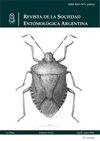Detection of the "poplar moth", Leucoptera sinuella (Lepidoptera: Lyonetiidae), in Argentina
IF 0.5
4区 农林科学
Q4 ENTOMOLOGY
引用次数: 0
Abstract
The presence of Leucoptera sinuella (Reutti) (Lepidoptera: Lyonetiidae), commonly known as the poplar moth, is cited for the first time for Argentina and, in particular, for the province of Mendoza. This economically important microlepidoptera mines poplar leaves (Populus spp.), reducing photosynthetic activity. Additionally, it can migrate to neighboring crops, for example, apple crops, pupating in its pedicle cavity. In Chile, it has caused the quarantine rejection of this fruit in countries such as the United States and Mexico. For all these reasons, monitoring the species, analyzing its establishment and taking control measures to prevent its spreading to other regions of the country, are imperative for the evaluation of this economically important species.阿根廷“白杨蛾”的检测
阿根廷,特别是门多萨省,首次出现了通常被称为白杨蛾的白翅目(Reutti)(鳞翅目:Lyonetidae)。这种在经济上很重要的微翼手目能开采白杨叶(Populus spp.),降低光合活性。此外,它可以迁移到邻近的作物,例如苹果作物,在其蒂腔内化蛹。在智利,它已经导致美国和墨西哥等国对这种水果的检疫拒绝。出于所有这些原因,监测该物种,分析其建立,并采取控制措施防止其传播到该国其他地区,对于评估这种具有重要经济意义的物种至关重要。
本文章由计算机程序翻译,如有差异,请以英文原文为准。
求助全文
约1分钟内获得全文
求助全文
来源期刊

Revista De La Sociedad Entomologica Argentina
Agricultural and Biological Sciences-Insect Science
CiteScore
0.80
自引率
20.00%
发文量
31
审稿时长
20 weeks
 求助内容:
求助内容: 应助结果提醒方式:
应助结果提醒方式:


